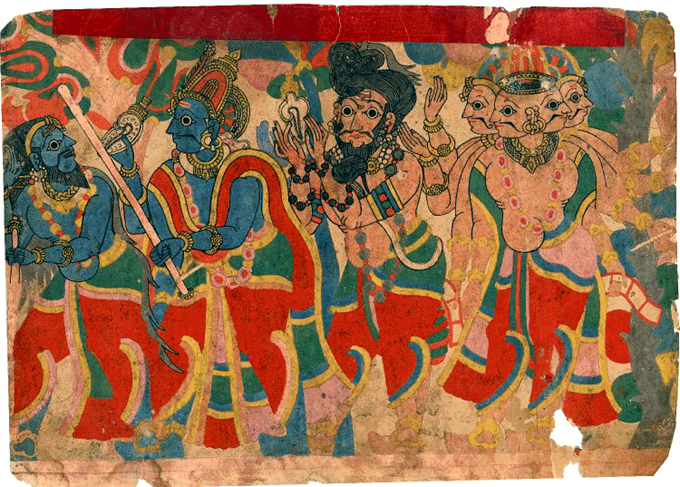
|
|
|
|
BY: SUN STAFF

Visnu, Brahma and Siva Bid Farewell to Vishvamitra Apr 26, 2013 — CANADA (SUN) — A serial exploration of the island of Jambudvipa and the sixteen Great States residing there.
The Vatsa Kingdom
The Vatsas (Vamsas or Vachchas) were a branch of the Kuru dynasty. The Kingdom of Vatsa corresponds with the region of modern Allahabad in Uttar Pradesh. During ancient times Vatsa had a monarchical form of government, centered at its capital city, Kausambi (known as the village Kosam, 38 miles from Allahabad). Kausambi was a very prosperous city where a large number of wealthy vysas resided. It was the most important port for goods and passengers traversing from the northwest and south.
Udayana was the ruler of Vatsa in the 6th c. B.C., during the time of Buddha. He was very powerful, warlike and fond of hunting. King Udayana had initially been opposed to Buddhism, but later became a follower of Buddha and made Buddhism the state religion.
There is only several mentions of Vatsa Kingdom in Mahabharata, but in the famous Sanskrit drama, 'Swapna Vasavadatta', author Bhasa speaks elaborately of the Vatsa king named Udayana and his paramour, Princess Vasavadatta.

The Gods receive Narada and Vasishtha Vatsa (Pali:Vamsa; Ardhamagadhi: Vaccha) is mentioned in Anguttara Nikaya as one of the sixteen mahajanapadas of Uttarapatha. The Puranas state that the Vatsa Kingdom was named after a Kasi king, Vatsa. Ramayana and Mahabharata attribute the credit of founding its capital Kausambi to a Chedi prince, Kusa or Kusamba. The Puranas also state that after the washing away of Hastinapura by the Ganges, the Bharata king Nicaksu, the great-great grandson of Janamejaya, abandoned the city and settled in Kausambi. This is supported by the Svapnavaasavadatta and the Pratijna-Yaugandharayana attributed to Bhasa. Both of them have described the King Udayana as a scion of the Bharata family (bharata-kula). In Mahabharata (1,188) Dhristadyumna describes each of the kings assembled in a letter from Dhristadyumna to his sister Panchali: "........the mighty charioteer Srutayu, Uluka, Kaitava, Chitrangada and Suvangada, the highly intelligent Vatsaraja (King of Vatsa Kingdom), the king of Kosala, Sisupala and the powerful Jarasandha, these and many other great kings—all Kshatriyas celebrated throughout the world—have come, O blessed one, for thee." Mahabharata (2,29) mentions that the mighty son of Kunti, Bhima subjugated by sheer force the country called Vatsa Bhumi (Vatsa Kingdom), and the king of the Bhargas, as also the ruler of the Nishadas and Manimat and numerous other kings. Regarding the travels of Amba, the Princes of Kasi, Mahabharata (5,189) states: "She then went unto Vatsa Bhumi resorted to by the Siddhas and Charanas, and which was the retreat of high-souled ascetics of pious deeds. Bathing frequently in the sacred waters of that retreat, the princess of Kasi roamed about according to her will." 
Babhruvahana fights Arjuna's troops at Kurukshetra Speaking of events on day 2 of the Battle of Kurukshetra, Mahabharata (6,50) states: "Dhristadyumna, the Commander-in-Chief of the Pandava Army, forms the military formation called Krauncharuma (bird-shaped array)." Yudhishthira, with the Patachcharas, the Hunas, the Pauravakas and the Nishadas, became its two wings, so also the Pisachas, with the Kundavishas, and the Mandakas, the Ladakas, the Tanganas, and the Uddras, O Bharata, and the Saravas, the Tumbhumas, the Vatsas and the Nakulas. Karna's military campaign is also narrated in Mahabharata (8,8) in which Dridharashtra reflects upon Karna, saying "Karna had subjugated many invincible and mighty foes—the Gandharas, the Madrakas, the Matsyas, the Trigartas, the Tanganas, the Khasas, the Pancalas, the Videhas, the Kulindas, the Kasi-kosalas, the Suhmas, the Angas, the Nishadhas, the Pundras, the Kichakas, the Vatsas, the Kalingas, the Taralas, the Asmakas, and the Rishikas." And referring to a rivalry with Bhargava Brahmanas, Mahabharata (12,49) states: "Bhargava Rama annihilated the Kshatriya kings. The Kshatriya mothers raised their children in secrecy. One among them was a Vatsa King…. Pratardana's son, named Vatsa of great might, has been brought up among calves in a cowpen." Sources: Mahabharata, Wiki, British Museum
| |